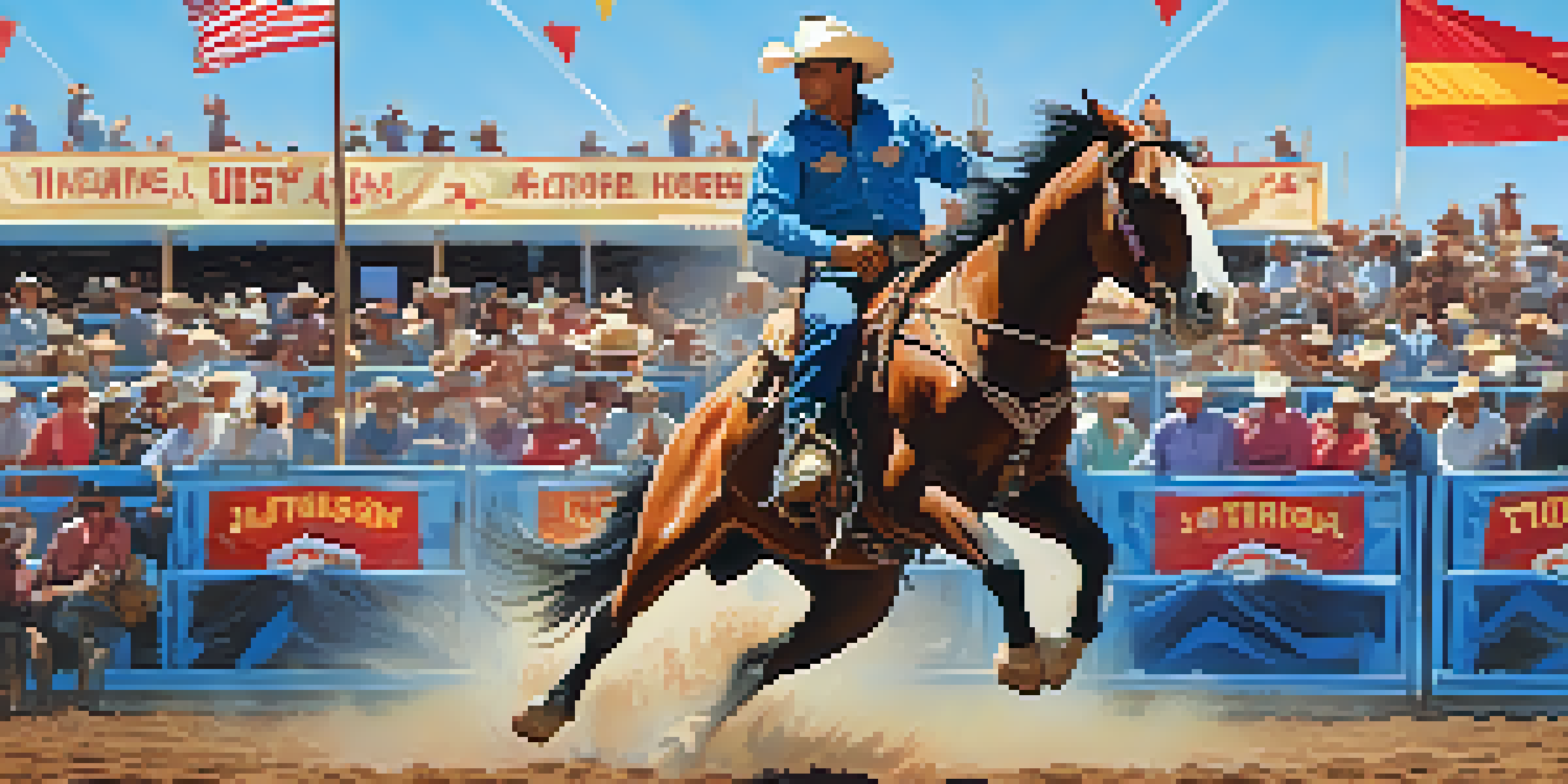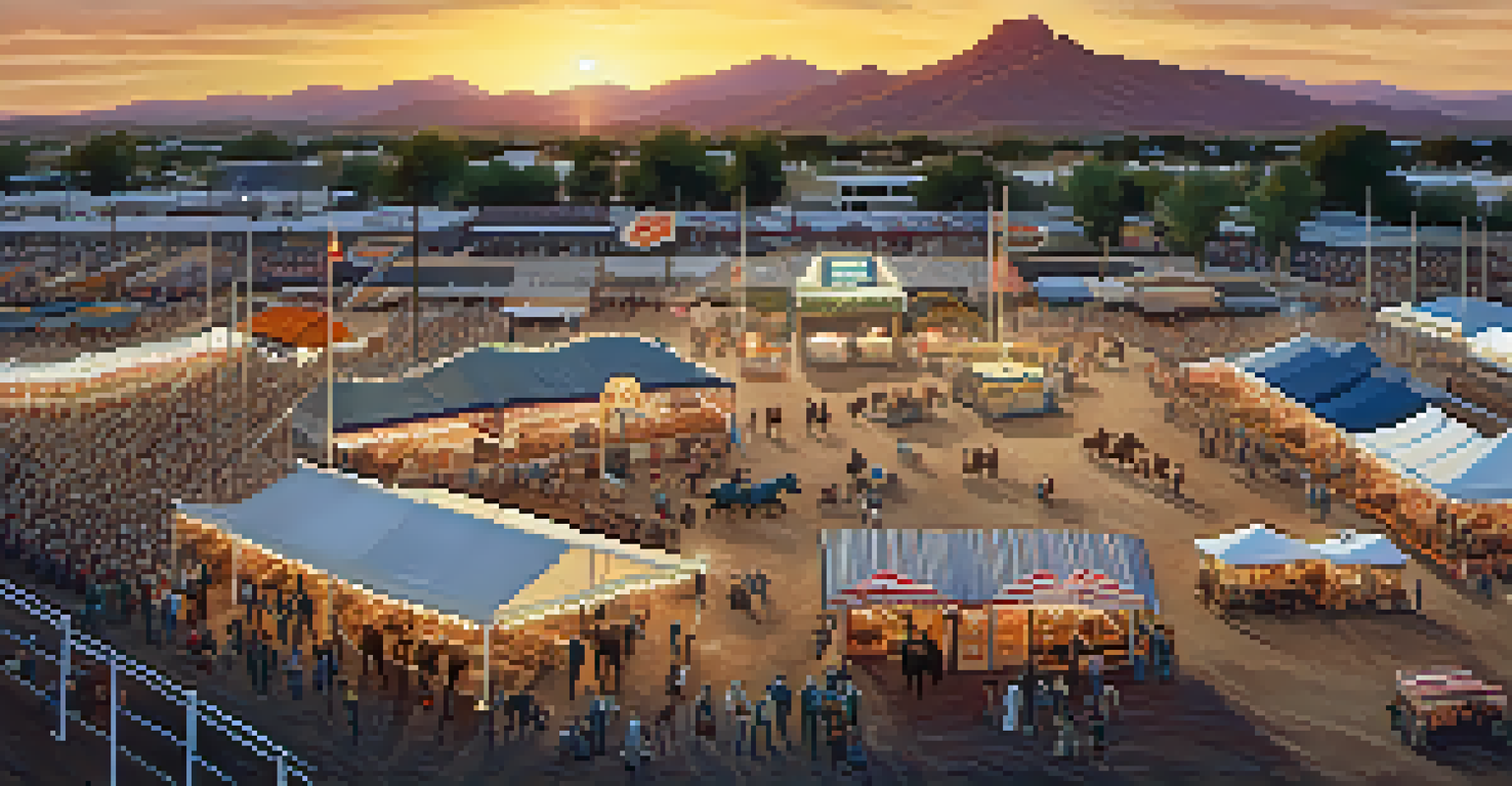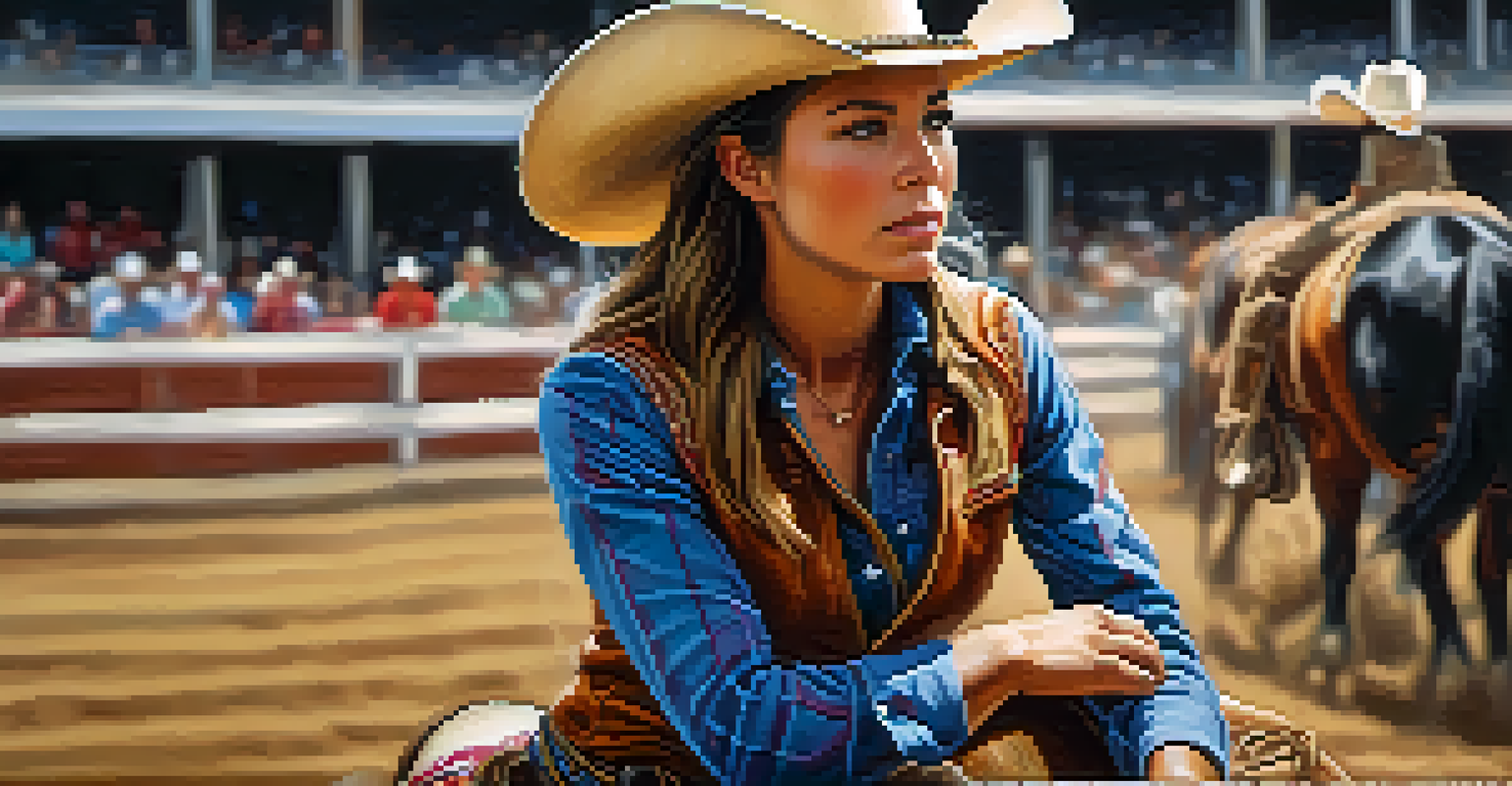The Tucson Rodeo's Role in Arizona's Cultural Identity

A Brief History of the Tucson Rodeo
The Tucson Rodeo, also known as La Fiesta de los Vaqueros, began in 1925 and has grown into a significant annual event. It started as a way to honor the area's ranching heritage and has since evolved into a celebration of cowboy culture. This rodeo showcases various competitions, including bull riding and barrel racing, drawing participants and spectators from around the region and beyond.
The rodeo is not just an event; it's a celebration of life, a gathering of families, and a showcase of our culture.
Over the decades, the rodeo has become a tradition for many families, making it a staple of local culture. It's not just about the competitions; it's a gathering that fosters community spirit and pride. The event has also adapted to include modern elements, ensuring that it remains relevant while still honoring its roots.
Today, the Tucson Rodeo is one of the largest and oldest rodeos in the United States, attracting thousands of visitors each year. Its rich history and the stories it tells are an integral part of Arizona's cultural fabric, reflecting the values and lifestyle of the region.
The Rodeo's Influence on Local Communities
The Tucson Rodeo significantly impacts local communities, serving as a platform for families to bond and celebrate their shared heritage. It offers an opportunity for local businesses to thrive, with vendors selling everything from cowboy hats to tasty treats. This economic boost is essential for the surrounding areas, especially during the event's peak.

In addition to economic benefits, the rodeo builds a sense of community pride. Residents come together to support local cowboys and cowgirls, cheering for their friends and neighbors as they compete. This camaraderie fosters a unique connection among attendees, creating lasting memories and friendships.
Tucson Rodeo: A Cultural Staple
The Tucson Rodeo celebrates cowboy culture and preserves Arizona's ranching heritage through various competitions and community engagement.
Moreover, the Tucson Rodeo promotes cultural exchange, attracting visitors from various backgrounds. This interaction enriches the local culture, allowing for the sharing of stories, traditions, and experiences that contribute to Arizona’s diverse identity.
Cultural Traditions and Heritage Preservation
The Tucson Rodeo is more than a sporting event; it is a celebration of cultural traditions that have been passed down through generations. Events like the rodeo help preserve the cowboy lifestyle, showcasing skills such as roping and riding that are integral to ranching heritage. This preservation is essential for maintaining a connection to the past.
Tradition is not the worship of ashes, but the preservation of fire.
Various aspects of the rodeo, such as traditional music and dance, highlight the rich cultural tapestry of Arizona. Local artists often perform, infusing the event with regional flair and inviting attendees to participate in the celebrations. This incorporation of art and culture makes the rodeo an immersive experience that resonates with people of all ages.
Through educational programs and demonstrations, the Tucson Rodeo also plays a role in teaching younger generations about their heritage. By engaging youth in these traditions, the rodeo ensures that the cowboy culture will continue to thrive in Arizona for years to come.
Rodeo as a Symbol of Arizona's Identity
For many, the Tucson Rodeo symbolizes the essence of Arizona’s identity, encapsulating the spirit of the Wild West. The vibrant atmosphere, filled with colorful outfits and the sounds of hoofbeats, evokes a sense of nostalgia and pride. This connection to the past is a reminder of the state's rich history and its roots in ranching and cowboy life.
The rodeo serves as a unifying event, bringing together people from various backgrounds to celebrate a shared love for the cowboy way of life. It stands as a testament to the values of hard work, resilience, and community that define Arizona. In many ways, the rodeo embodies the spirit of the state itself.
Economic Boost for Local Businesses
The rodeo significantly impacts the local economy by attracting thousands of visitors, benefiting hotels, restaurants, and vendors.
As a cultural touchstone, the Tucson Rodeo has become a beloved tradition that resonates deeply with both locals and visitors. It is a celebration of Arizona’s uniqueness, showcasing the beauty of its landscapes and the strength of its people.
Economic Impact of the Tucson Rodeo
The Tucson Rodeo generates significant economic benefits for the local community, attracting thousands of visitors who contribute to the economy. Hotels, restaurants, and retailers often experience a surge in business during the rodeo, illustrating the event's role as an economic driver. This influx of tourism helps sustain jobs and supports local entrepreneurship.
Moreover, the event creates opportunities for local artisans and vendors to showcase their products, further enriching the community's economic landscape. From handmade crafts to regional foods, the rodeo serves as a marketplace that highlights the talents and creativity of local residents.
In addition to immediate economic benefits, the rodeo fosters long-term investment in the community. The funds raised through ticket sales and sponsorships often contribute to local initiatives and charities, ensuring that the positive impact of the rodeo extends far beyond the event itself.
Promoting Inclusivity and Diversity at the Rodeo
The Tucson Rodeo is committed to promoting inclusivity and diversity, welcoming participants from all backgrounds. This commitment is evident in the varied events that showcase different skills and talents, allowing everyone to shine. The rodeo encourages participation from youth, women, and underrepresented groups, helping to create a more equitable environment.
By showcasing diverse competitors and performers, the rodeo reflects the multicultural fabric of Arizona. This representation fosters a sense of belonging for all participants, making the event a true celebration of community. It highlights the importance of inclusion in preserving and promoting cultural heritage.
Promoting Inclusivity and Diversity
The Tucson Rodeo fosters a sense of belonging by welcoming participants from diverse backgrounds and encouraging community collaboration.
Furthermore, the rodeo often partners with local organizations to offer workshops and activities that engage different communities. These initiatives not only enhance the experience for attendees but also strengthen the bonds between diverse groups, showcasing the power of unity in celebrating shared traditions.
The Future of the Tucson Rodeo
As the Tucson Rodeo continues to grow, its future looks bright, with plans to expand and innovate while honoring its roots. Organizers are exploring new ways to engage the community, incorporating technology and social media to reach younger audiences. By embracing modern trends, they aim to keep the rodeo relevant and exciting for future generations.
Additionally, the rodeo is committed to sustainability, implementing practices that minimize environmental impact. This includes initiatives like waste reduction and promoting local produce within the event. Such efforts not only enhance the rodeo experience but also reflect a growing awareness of environmental responsibility.

Ultimately, the Tucson Rodeo will continue to evolve, adapting to the changing times while remaining a cherished part of Arizona’s cultural identity. With its rich heritage and community support, the rodeo is poised to thrive for years to come, ensuring that the spirit of the cowboy remains alive and well.